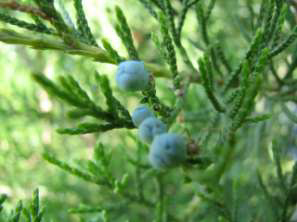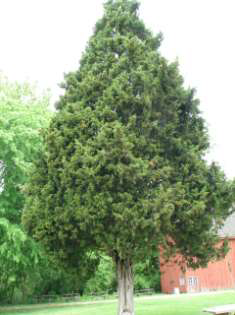 Eastern Redcedar
Eastern Redcedar
(Red Juniper)
(Juniperus virginiana L.)
|
Classification |
| Kingdom: |
Plantae |
| Division: |
Pinophyta |
| Class: |
Pinopsida |
| Order: |
Pinales |
| Family: |
Cupressaceae |
| Genus: |
Juniperus |
| Species: |
J. virginiana L. |
 Characteristics: Eastern Redcedar is an evergreen, aromatic tree with a trunk that is often angled and slightly wider at the base, but with a narrow, compact crown that sometimes becomes broad and irregular. It grows to heights ranging from 40 to 60 feet with a trunk diameter of 1 to 2 feet. However, in poor soil it may never become more than a shrub. The leaves are evergreen and opposite in 4 rows forming
slender quadrangle twigs. The bark is reddish brown, thin, fibrous, and shreds easily. The cones are small, approximately 1/4 to 3/8 of an inch in diameter and are berry-like in appearance. The pollen cones are on separate trees from the berries.
Characteristics: Eastern Redcedar is an evergreen, aromatic tree with a trunk that is often angled and slightly wider at the base, but with a narrow, compact crown that sometimes becomes broad and irregular. It grows to heights ranging from 40 to 60 feet with a trunk diameter of 1 to 2 feet. However, in poor soil it may never become more than a shrub. The leaves are evergreen and opposite in 4 rows forming
slender quadrangle twigs. The bark is reddish brown, thin, fibrous, and shreds easily. The cones are small, approximately 1/4 to 3/8 of an inch in diameter and are berry-like in appearance. The pollen cones are on separate trees from the berries.
Habitat: Eastern Redcedar is found in microenvironments that range from dry uplands to flood plains and swamps. It can also inhabit abandoned fields and fence rows, and can be found scattered in pure stands.
Range: It is widespread among the eastern half United States, from Maine to Florida and Texas to North Dakota.
Native American Uses: Decoctions made from Eastern Redcedar were used to treat worms, infusions to treat colds and diarrhea, and decoctions from twigs to treat rheumatism. Infusions made from the bark and the berries were used to treat summer cholera and asthma. Native American tribes that commonly utilized the Eastern Redcedar were the Cherokee, Iroquois, and the Rappahannock Indians.
Colonial Uses: The colonists used the wood for making fence posts and cedar chests, cabinets and carvings. Cedar oil, used in medicines and perfumes, was obtained from the leaves and the wood.
Modern Uses: Although it is now grown predominately for Christmas trees, shelterbelts, and as an ornamental, it is not usually planted near apple orchards because Eastern Red Cedar is an alternative host for cedar-apple rust, a fungal disease, which could decimate an orchard.